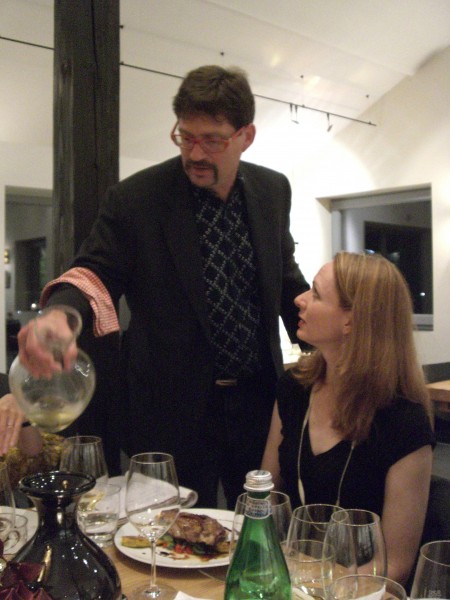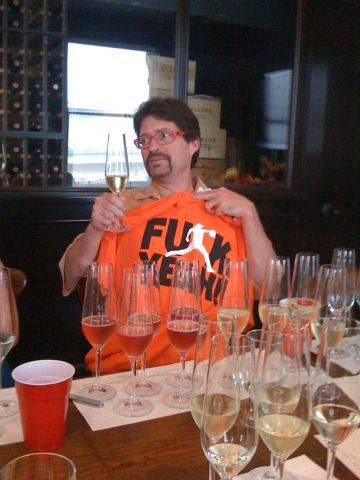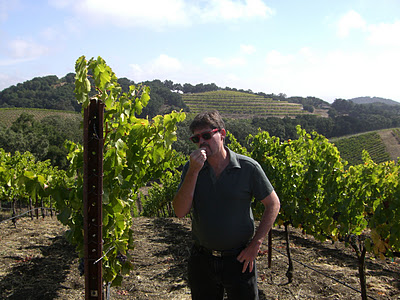I was reading a baseball chat last year with Keith Law, an ESPN writer who also answers cooking questions, when the following exchange came across (it’s from memory, so might not be verbatim):
Fan: Do all wine snobs always wave their pinkies in the air?
Law: I drink beer, so I don’t know.
The “wine snob” is a pernicious villain in modern America, a witch of Salem that must frequently be rooted out and publicly flogged.
Just like the witches of Salem, the wine snob exists mostly in our imagination. He (they’re always men) is a fictitious character, like Miles in Sideways, the Stepin Fetchit of the archetype. The sports fan above thinks you, dear reader, also constantly claim you taste “the faintest soupçon of asparagus and just a flutter of nutty Edam cheese.”
Hatred of a straw man is a powerful force. Search “wine snobs” online and you find many posts about these awful creatures. People love it when they’re humiliated. Some food critics make sure you know they’re not a wine snob, even in columns where they nitpick the hell out of some poor food truck’s cheeseburger.
What IS a wine snob exactly?
The first item that came up for my Google search—snobsite.com—opens thus: “Wine snob. Isn’t that a redundancy, like saying wet rain or nuisance telemarketer?” A little later, “Wine Snobbery is, therefore, the default state of the wine enthusiast.”
Really. So we have no choice, do we? Once we decide we’d rather drink something other than Two Buck Chuck—and have the temerity to say so—we’re wine snobs?
 Joel Stein wrote in the Los Angeles Times in 2008: “When wine drinkers tell me they taste notes of cherries, tobacco and rose petals, usually all I can detect is a whole lot of jackass … I miss the days when we made fun of wine snobs for saying that a wine was ‘ingratiating without being obsequious.’ Now wine snobs are too boring to make fun of.” Stein goes on to blame the aroma wheel, which encouraged wine lovers to stop saying wine has a “shaggy nose” and to describe its components in a way that others could understand.
Joel Stein wrote in the Los Angeles Times in 2008: “When wine drinkers tell me they taste notes of cherries, tobacco and rose petals, usually all I can detect is a whole lot of jackass … I miss the days when we made fun of wine snobs for saying that a wine was ‘ingratiating without being obsequious.’ Now wine snobs are too boring to make fun of.” Stein goes on to blame the aroma wheel, which encouraged wine lovers to stop saying wine has a “shaggy nose” and to describe its components in a way that others could understand.
The way Stein felt about more accurate wine tasting notes, it was like telling Stepin Fetchit, “Stand up straight and stop saying ‘Yes massuh’.” Where’s the fun in that? C’mon wine snobs, get your pinkies out where they belong!
I can personally testify to the negative way wine aficionados are viewed because I’ve been opinionated all my life, and only got into wine in my late 20s.
I think 98% of all TV shows broadcast over the air are unwatchable crap. But nobody has ever called me a TV snob (even though, really, I am). I can’t watch an entire NBA game on TV because the 24-second clock makes the first three quarters meaningless. Nobody has ever called me a sports snob.
I’m much more open-minded about wine. You would need two strong men to drag me into Sex and the City 2, easier done if they’re armed. But I’ll try your South Dakota raspberry wine, and if I like it, I’ll give it a gold medal.
Yet if I dare suggest that I prefer Mosel Rieslings to California Rieslings because they have greater acidity and appealing minerality, I’m just not a man of the people.
I got inspired to write this post by something forwarded online by the Wine Library and by former Palate Press executive editor WR Tish: How to Deal with a Wine Snob, written by a site called Wine Folly.
From the first paragraph: “A know-it-all wine snob can ruin a wine experience by forcing the ‘right’ agenda down your throat, along with the ‘right’ wine … We’ve all been to a party where a wine snob is talking down their nose at the complimentary [sic] 2-Buck Chuck.”
 This is the low hurdle for being a wine snob: Somebody who has an opinion and doesn’t want to drink 2-Buck Chuck. You can stand there at the same party expressing your opinion of, oh I don’t know, good and bad mountain bikes, or first-person-shooter games, or places on the body to get poison oak, and that’s okay. You can proclaim that any self-centered modern diet—50-mile foodshed locavore, Paleo, cruelty-free vegetarian—prevents you from being able to eat the snacks provided, and that’s okay.
This is the low hurdle for being a wine snob: Somebody who has an opinion and doesn’t want to drink 2-Buck Chuck. You can stand there at the same party expressing your opinion of, oh I don’t know, good and bad mountain bikes, or first-person-shooter games, or places on the body to get poison oak, and that’s okay. You can proclaim that any self-centered modern diet—50-mile foodshed locavore, Paleo, cruelty-free vegetarian—prevents you from being able to eat the snacks provided, and that’s okay.
But if you dare tell people they should seek out wines that are not just brand names, but come from a specific place, preferably a single vineyard …
Here’s an older man I meet now and then: “I used to buy cases of the first growths. You know what I paid for the ’61 Latour? $2.50 a bottle.” And that jerk, he never offers to open one for you. I hate those guys. But they’re not wine snobs; they generally can’t tell you what these wines taste like. They’re just snobs. Ask him about the car he drives. You’ll see.
But he’s not the one giving the rest of us a bad name. It’s just that we have the temerity to care about wine. We can’t win in this environment. Every single time I’m asked about 2-Buck Chuck—it has been hundreds—I answer respectfully that it’s amazing value, is the best wine you can buy for $2, and that I love the fact that it allows teachers and social workers and other underpaid people to have a bottle of wine on their dinner table that’s actually drinkable. I’ve never talked down my nose at it, not like I will about American Idol or Jersey Shore or other programs people love. But still.
There’s no way to avoid the definition, so we have to do what gay people have done with so many onetime slurs. In my neighborhood in San Francisco, there are parties called “fag Fridays.” This is our task: to adopt, redefine, and wear with pride.
I’m a wine snob. Yes I am. You are too. Together we are more powerful.
[author] [author_image timthumb=’on’]http://palatepress.com/wp-content/uploads/2010/03/blake2.jpg[/author_image] [author_info]Wine writer W. Blake Gray is Chairman of the Electoral College of the Vintners Hall of Fame. Previously wine writer/editor for the San Francisco Chronicle, he has contributed articles on wine and sake to the Los Angeles Times, Food & Wine, Wine & Spirits, Wine Review Online, and a variety of other publications. He travels frequently to wine regions and enjoys coming home to San Francisco.[/author_info] [/author]

